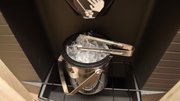Blog
Will The EUs Energy-Saving Rules For Brewers Really Save Energy?
March 5, 2015 | Kevin Daw
TAGS: Vending Times columnist, vending, office coffee service, OCS editorial, coffee industry, coffee market, coffee roasting, Heritage Coffee, Kevin Daw, unintended consequence of laws, Big Brother, EU coffee brewer policy, European Union coffee brewer mandate |
Over the years, governments have always stuck their collective noses deep into the business of business. Sadly, through lack of forethought, or just a lack of business sense and knowledge, things can go badly awry, and the "unintended consequences" demon can rear its ugly head in surprising fashion to wreak havoc on those whose industry is pinned beneath Big Brother's watchful eye. To be fair, in a social system as complex as mankind's is at present, it is nearly impossible to fully predict the outcomes of policy set with all good intentions.
Recently, I was copied on a press release announcing that the European Union has mandated new rules for coffee brewers, drip brewers in particular. Under the new rules, drip-filter machines with non-insulated jugs (the old glass carafe or "bowls") must power down 40 minutes after the end of the last brewing cycle.
Domestic drip-filter coffee machines with insulated jugs, which keep the coffee warm and preserve its taste without further heating, must switch off after five minutes.
The rules do not apply to espresso machines when they are grinding, frothing milk, steaming or brewing, but they will be required to switch off automatically after 30 minutes; the maximum time setting to keep cups warm will be one hour, after which the warmer will shut down.
Though this policy is only being implemented in Europe at this point, there will likely be consideration of similar rules on our shores. (The National Automatic Merchandising Association last year filed comments with the Environmental Protection Agency regarding the agency's request for feedback on its recently published Energy Star Commercial Coffee Brewers draft specification framework document.) Whenever I hear of the type of policy-setting in Europe, my mind instantly leaps to its implications.
We can assume existing drip brewers would be grandfathered in, so maybe we will not have the shock undergone by cigarette vendors who suddenly had their bread-and-butter vending machines banned, with no recourse, some years back. Still, for brewer companies, there is suddenly a need for redesigns, and they'll have to loosen their belts a notch or two or their R&D budgets.
Brewers suddenly thrown into European obsolescence will likely find their way to other continents, so that might not hurt too badly for equipment manufacturers and distributors either.
There will be an increased cost for these types of brewers, and it surely will be passed along to consumers and coffee operators, mitigated by energy savings to some extent -- for consumers, but not for operators.
Inconvenience Hurts Sales
A little more painful, and harder to gauge, will be the possible reduction in overall coffee consumption. Once an espresso machine powers down due to a slow period, say from 2 p.m. to 3 p.m., remembering to get it back up to full pressure will be important in order not to lose any mid-afternoon "happy hour" sales.
The policy has been put in place to save electricity and so reduce energy use. The objective -- the intended consequence -- is to save the environment. And that goal leads to my biggest concern regarding the unintended consequences of such a policy. When a restaurateur discovers his or her espresso brewer has powered down, the most likely immediate reaction will be to power it back up. It is less costly and more efficient to keep the water hot than to let it cool down and then recover to the correct temperature, depending on how much heat was lost during the shutdown and the length of time for which the unit was powered down. There are no guarantees the policy will save anything there.
Beyond this, many consumers may finally throw up their hands and move to one of the many single-cup brewer options on the market. If an office has to warm up a brewer on Monday morning, heat bank-based single-cup equipment will likely be preferred. It can be argued as to how badly the expanded waste created by spent single-cup cartridges affects the environment, but certainly from a sustainability perspective, this style of brewing uses a lot of petroleum-based byproducts in the packaging, collectively a far greater amount than traditional open-brew pouches.
Another consequence of single-cup brewing is that far more space is taken up on a per-cup basis in freight trucks and delivery vehicles. That is a lot more carbon-combustion compounds being emitted just to get single cups to the consumer. If there is truly concern for the environment, although this does not affect operators directly at present, it may well be something looked at unfavorably by environmental panels in the future.
This possible outcome may well have been overlooked when the EU created this new legislation.
These are just a few thoughts that come to mind when considering this legislation. I am sure time will expose a few more unforeseen consequences.
Where vacuum cleaner power is reduced, also mandated by the EU, consumers will just vacuum longer; and where there is a bounty put on cobras' heads to reduce the cobra population, people will begin to breed cobras (happened in India).
Whatever the new policy, there are always related consequences. Although our fearless leaders mean well, their good intentions too often create negative outcomes for those affected by the resulting policies.
I hope to see all of you at the upcoming NAMA OneShow in Las Vegas. As always, may your cup be full, and the brew exquisite!
 KEVIN DAW is president of Heritage Coffee Co. (London, ON, Canada), a private-label roaster serving the breaktime management industries. A 30-year veteran of OCS, water delivery and vending operations, he has concentrated on coffee roasting for the past two decades.
KEVIN DAW is president of Heritage Coffee Co. (London, ON, Canada), a private-label roaster serving the breaktime management industries. A 30-year veteran of OCS, water delivery and vending operations, he has concentrated on coffee roasting for the past two decades.






